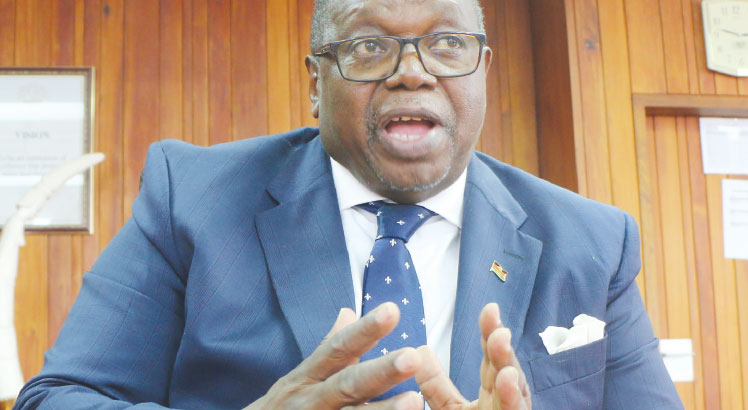The introduction of periodic foreign exchange auctions by the Reserve Bank of Malawi (RBM) has attracted mixed views with stakeholders faulting the move, saying it will trigger a sharp depreciation of the kwacha.
In a statement on Friday, RBM Governor Wilson Banda justified the move, saying it will facilitate the discovery of a prevailing market-clearing exchange rate for the kwacha against major currencies, thereby promoting transparency in the determination of the exchange rate.
But in their reactions on Friday, the stakeholders that included Financial Market Dealers Association of Malawi (Fimda) president Leslie Fatch, former RBM governor Dalitso Kabambe and former minister of Finance Joseph Mwanamvekha said if not properly implemented, the move could lead to a sharp depreciation of the kwacha though it will reflect the market forces of demand and supply.
But Fatch said with the new arrangement, the exchange rate will be responsive to market forces, adding that they hope this will take away the debate about the currency being overvalued or undervalued.
“The market feels the auctions will be taking our forex from the market to the Reserve Bank of Malawi as the banks will be selling the forex to the central bank,” he said.
Banda: These auctions will facilitate discovery of
a prevailing market-clearing exchange rae
Fatch said the effectiveness of the move will depend on a number of factors, among them being the frequency at which the auctions will be conducted and secondly, how the rates derived from the auctions will be factored into the pricing of forex in the market.
He said: “There have been calls from different sectors of the economy for the authorities to align the exchange rate to the black market rate.
“These calls were emanating from the fact that the current pricing mechanism does not allow the rate to move as freely; hence, the black market rate moving responsively to the demand and supply forces.”
Writing on his facebook page, Kabambe said the move shows lack of financial prudence and sound economic principles.
“As it is, we can simply say that the kwacha is being devalued silently with the government opting to heap the blame on the private banks. The truth is that there are no shortcuts to fixing the situation,” he said.
Kabambe said authorities are ignoring the reality that has been worsened by rampant corruption, borrowing appetite, needless payouts “and all the shoddy economic principles this government implemented in 2020”.
In his reaction on Friday, Mwanamveka said the foreign exchange auctions once failed in the early 1990s and there is no need for the central bank to re-introduce them.
The RBM introduced the forex auctions between 1990 and 1995 before they were abandoned later in 1995.
The policy sought to improve the country’s export competitiveness, provide efficient foreign exchange allocation to banks, maintain price stability, dampen speculative attacks on the kwacha and restore investor and donor confidence.
But Mwanamveka said after introducing this system in January 1994, the kwacha devalued by over 300 percent, with inflation and interest rates increasing to levels that affected people’s disposable incomes.
“I am, therefore, dismayed or astounded that the Reserve Bank of Malawi wants to revert to such failed foreign exchange policy regime,” he said.
Mwanamveka said it does not make sense for the RBM to re-introduce a policy that failed to achieve its intended objectives.
He said such a foreign exchange policy regime cannot work in a developing country such as Malawi.
Mwanamveka said Malawians should expect massive devaluation of the kwacha, increase in inflation and interest rates which in turn will lead to an increase in commodity prices.
A study titled ‘The Efficacy of Foreign Exchange Intervention in Malawi’ by Kisu Simwaka and Leslie Mkandawire noted that the intervention is, to some extent, used as an effective tool for moderating fluctuations of the kwacha.
Reads the study in part: “However, its effectiveness is constrained by the amounts of foreign exchange reserves which are usually low.”
Economist Edward Chilima, who once served as Economics Association of Malawi president said the move is a market-oriented approach, but the worry is on how commercial banks behave on these auctions.
He said: “It is worrying given the history of Malawi commercial banks which are profit-oriented. The banking sector is like a cartel. The market has a shortage of currency.
“I am personally worried with the outcome of this exercise, not because of it, but because of my long time fear of how banks behave in Malawi.”
In the statement, RBM Governor said the foreign exchange auctions will see authorised dealer banks (ADB) submitting bids to sell foreign exchange to the RBM.
“These auctions will facilitate the discovery of a prevailing market-clearing exchange rate for the Malawi kwacha against major currencies, thereby promoting transparency in the determination of the exchange rate,” said Banda.
He said this will be done at prices freely determined by each of the participating ADBs with bids set at a minimum of $50 000 and in multiples of $10 000 thereafter.
Meanwhile, the central bank held its first foreign exchange auction on Friday.
The kwacha was last devalued by 25 percent in May 2022, a move the central bank said was meant to align the foreign exchange supply to the macroeconomic fundamentals.
The post RBM faulted on forex auctions appeared first on The Nation Online.
 Moni Malawi
Moni Malawi 

